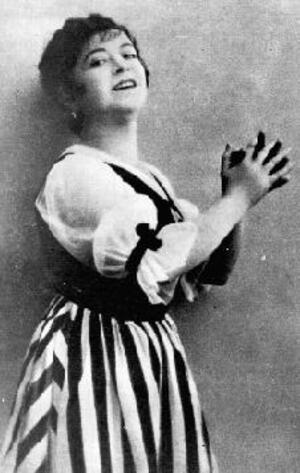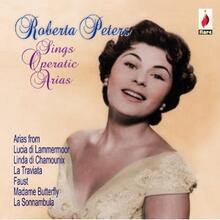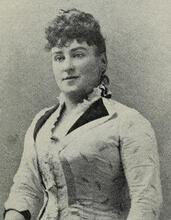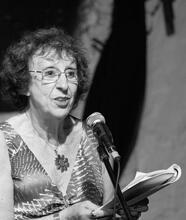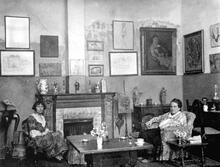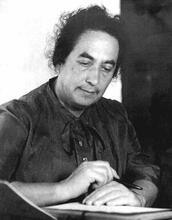Isa Kremer
Isa Kremer.
Courtesy of Wikimedia.
Star of opera and concert stage, the charismatic Isa Kremer traveled far from her birthplace of Belz, Bessarabia. She lived her life in a global arena despite bitter conflicts: the Russian Revolution, the fall of the Ottoman Empire, anti-Semitism in Russia, Poland, and Germany, and the Peronist dictatorship in Argentina. As a young singer she married a wealthy man 27 years her senior, Israel Heifetz, the editor of The Odessa News, and in her later years she married an eminent Argentine psychiatrist, seven years younger. When she died in Córdoba, Argentina, she had sung before a tsar, sultans, generals and princes. Kremer sang in 24 languages and made talking films in Hollywood, but her great legacy is her repertoire of Yiddish songs.
Early Life & Education
Diva, folksinger, and citizen of the world, Isa Kremer [née Lea (Izabella) Iankelevna Kremer] was born in Belz, Bessarabia, on October 21, 1887, to Jacob and Anna (Rosenbluth) Kremer. She grew up in bourgeois comfort, because her father had served as provision master in the czar’s army. She had a governess and attended a secular gymnasium, where she led the choir in Russian Orthodox prayers. She could not, however, ignore the plight of impoverished Jews in her hometown. As a teenager, she wrote revolutionary poems, which she sent to the Odessa News. The editor Israel Heifetz, publisher and owner of theaters, invited her to Odessa and, convinced of her musical talent, underwrote her studies with the famed Professor Ronzi in Milan, Italy. She sang opera for a brief time, debuting as Mimi in La Bohème opposite Tito Schipa in Cremona in 1911, and then toured czarist Russia as a star of the Imperial Opera in Petrograd, of operettas, and of the concert hall.
After her marriage to Heifetz (27 years her senior) around 1912, Kremer became involved in the intellectual and artistic life of Odessa. Her charm as a chanteuse was praised by Isaac Babel. She was especially influenced by the circles of Mendele Mokher Seforim, Mark Warshawski, and Chaim Nachman Bialik. Bialik convinced her to sing Yiddish folk songs, which she started to collect. At that time only men, usually cantors, performed these traditional songs of home and hearth on the stage.
A Peripatetic Life after the Revolution
In the aftermath of the Revolution, the Bolsheviks imprisoned Heifetz, garrisoned the couple’s Odessa home, and confiscated their other property. Heifetz and Kremer had supported Kerensky. Kremer, at that time singing in Istanbul, remained there until she could arrange to smuggle her daughter Toussia (1917-2009), the governess, and her mother and brother out of Odessa. Like countless Russian emigrés, the family lived in Poland, Berlin, and Paris. Kremer bribed officials to release her husband from prison. After they settled in Paris, the couple separated. During the Nazi occupation of France, Heifetz was taken to a concentration camp in Belgium, where he died.
Kremer’s extensive tours throughout Europe in the 1920s and 1930s exposed her to virulent antisemitism. She sang at the Warsaw Symphonic Hall in 1922, despite death threats and demonstrations by the Stowarzyszenie Patritow [Patriotic League]. At Berlin’s Jüdischer Kulturbund, an institution created after Hitler segregated Jewish performers and audiences from “Aryan” ones, Kremer insisted upon including Yiddish songs, although the German Jews preferred the classical art songs in her repertoire.
Emigration to the United States
Represented by Sol Hurok, Kremer gave her first concert in the United States on October 29, 1922, at Carnegie Hall, to critical acclaim. She brought her family to the United States in 1924 and eventually became a citizen. She made talking films for Vitaphone in 1927 and recorded for Brunswick and Columbia. In 1931, Chappell in London published Album of Jewish Folk Songs, a book of 24 Yiddish folk songs, named after Kremer’s popular concert series.
In the 1930s, Kremer’s tours took her through the United States, Canada, Europe, Africa, Palestine, and Latin America. Alexander Olshanetsky wrote the song “Mayn shtetele Belz” to honor Kremer’s hometown for The Song of the Ghetto, the only Second Avenue musical Isa ever played. According to Kremer’s daughter Toussia Pines, she had been promised she would play opposite Jan Peerce, but Seymour Rexite was her co-star. In 1938, she went to Argentina, where she met the eminent psychiatrist and activist Gregorio Bermann (1894-1972). Bermann and Kremer were married by proxy in Mexico because divorce was not legal in Argentina. (Bermann could not divorce his first wife, who was living in Chile to work with the newly elected radical government.) In Argentina, Kremer sang at benefits for Nazi victims and for striking workers, often in collaboration with María Teresa León, a Spanish Republican exile. Because Kremer and Bermann were blacklisted by Juan Perón, the populist president with dictatorial powers, the 1940s and 1950s were years of economic hardship and political harassment for the couple.
Kremer died of cancer in Córdoba, Argentina, on July 7, 1956. Her archives, including an extensive collection of music in the 24 languages in which she sang, were donated to the IWO Library in Buenos Aires. Those archives survived the bombing of the AMIA on July 18, 1994.
Selected Works
Kremer, Isa. “Pages from My Life Story,” Morning Journal (in Yiddish), April 26, 1933.
Kremer, Isa. A Jewish Life in Song (record album of Jewish songs) (1931).
Kremer, Isa. Album of Jewish Folk Songs (London) 1930.
Babel, Isaac. Odessa, 1916.
BEOAJ.
Jabotinsky, Vladimir. “Odessa—Isa Kremer’s City.” Every Friday (Cincinnati), February 5, 1932, 5.
Obituary. NYTimes, July 9, 1956, 23:4.
Saleski, Gdal. Famous Musicians of Jewish Origin (1949).
Schwartz, Marcel M. “Isa Kremer—A Biographical Sketch.” Every Friday (Cincinnati), February 5, 1932, 3, 5.
WWIAJ (1926, 1928, 1938).
Recorded Sound Archives of Florida Atlantic University have 32 recordings of Isa Kremer: https://rsa.fau.edu/artist/275

